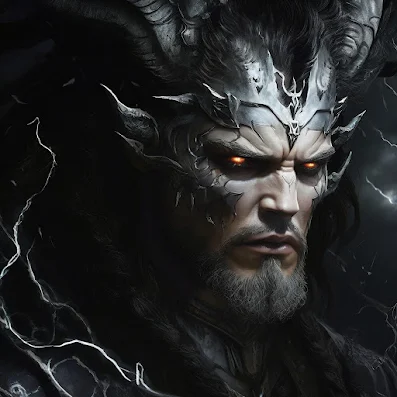In Ancient Egyptian mythology, the Lord Set was a complex deity associated with chaos, storms, and violence. Set was often depicted as a powerful figure with the head of an unknown animal, sometimes described as resembling a combination of a donkey or an aardvark. Set was considered to be the brother of Osiris, Isis, and Nephthys, and the uncle of Horus. One of the most known narratives involving Set is the conflict between him and his brother Osiris. Set was jealous of Osiris's power and popularity, so he tricked Osiris into entering a coffin, which he then sealed and threw into the Nile River. Osiris drowned, and his body was dismembered by Set. Isis, Osiris's wife and sister, managed to retrieve and reasonable his body, allowing Osiris to become the god of the afterlife. This act of violence and betrayal by Set against Osiris led to a long-standing feud between Set and Osiris's son, Horus. The conflict between Horus and Set symbolizes the eternal struggle between order and chaos in Egyptian mythology. Despite his negative associations, Set was also seen as a protector deity, particularly in the desert regions where storms were common. In ancient Egyptian mythology, the birth of Set (also known as Seth) is intricately tied to the creation myth and the pantheon of Egyptian gods. Set was believed to be the son of Geb, the god of the earth, and Nut, the goddess of the sky. According to the Egyptian story, Set was born alongside his siblings, Osiris, Isis, and Nephthys.
Set's character evolved over time in Egyptian mythology, reflecting the changing beliefs and societal values of the ancient Egyptians. Initially, Set was associated with chaos, storms, and violence, often depicted as a powerful and sometimes malevolent figure. He was seen as a force of disruption and disorder, in contrast to the more benevolent figure. He was seen as a force of disruption and disorder, in contrast to the more benevolent deities like Osiris and Horus. Set's character also played a significant role in Egyptian cosmology representing the harsh and unpredictable aspects of nature, particularly the desert and storms. As a deity of chaos, Set was sometimes viewed as a necessary counterpart to the order and stability represented by other gods in the pantheon. Over time, Set's character became more complex, with some interpretations portraying him as a protector deity, particularly in the desert regions where storms were common. Despite his negative associations, Set was also seen as a defender against threats and a symbol of strength and resilience. In Egyptian mythology, Set's character embodies the duality of nature and the eternal struggle between order and chaos. His role as both a destructive and protective deity reflects the multifaceted nature of ancient Egyptian beliefs and the intricate relationships between the gods in the pantheon.


